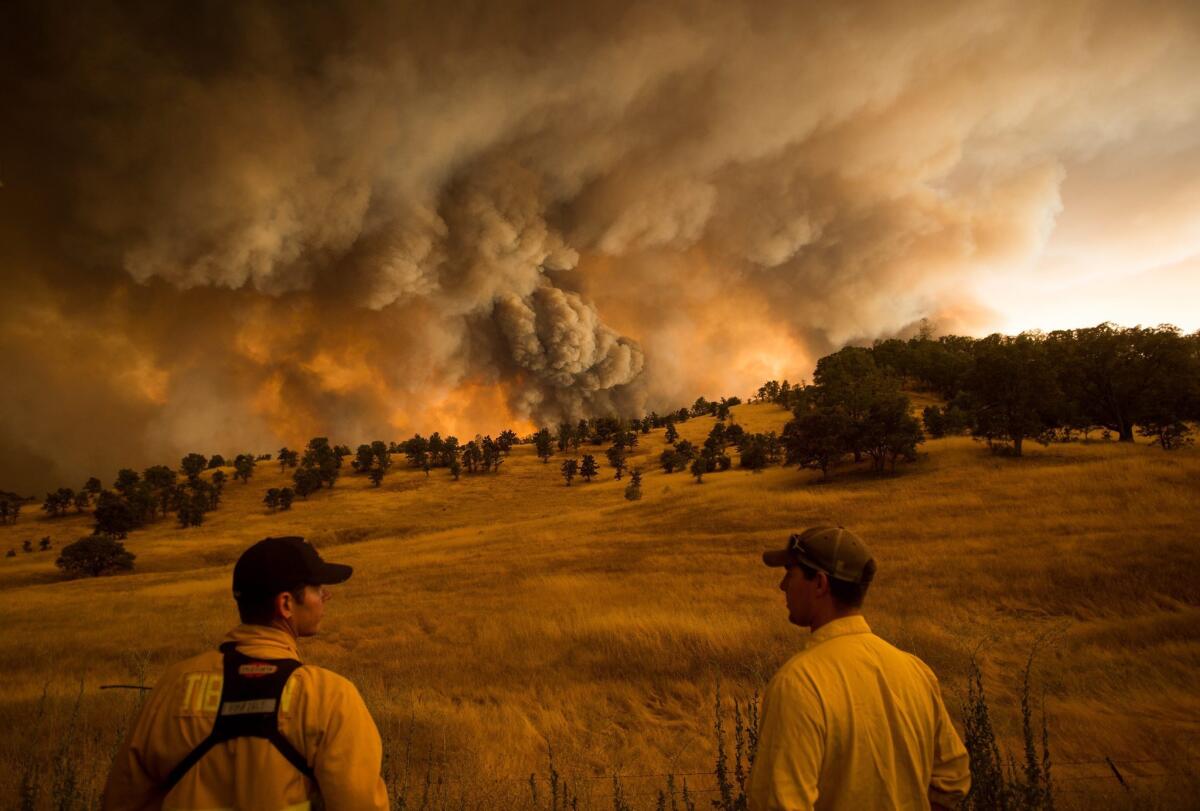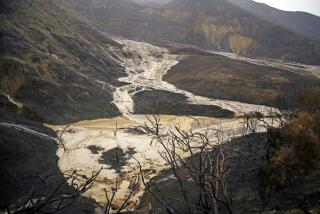Readers React: Don’t dismiss the link between wildfires and climate change, scientists say

Firefighters watch as the Rocky fire burns near Clearlake, Calif., on Aug. 1.
Was Gov. Jerry Brown wrong to blame this year’s epic California wildfires on climate change? An Oct. 18 Times article said he was; scientists and activists responding to that article say it’s a lot more complicated.
Tuesday, two letters that didn’t weigh in on the science underpinning The Times’ reporting were published. Since then, several experts have written to say the article was wrong to assert that climate change isn’t fueling the state’s historically large fires. Here are some of their letters.
Max Moritz, a UC Berkeley environmental scientist, says raising awareness is what’s important:
It’s splitting hairs, as scientists often will, to note that we may not know conclusively whether climate change has caused this particular drought and these specific wildfires. As a wildfire scientist, I find it troubling that this nuance became front-page news because it implies more uncertainty about climate change than there really is among experts.
In fact, there is relatively strong agreement among fire scientists about links between climate change and wildfire, even if quantitative attribution poses challenges. To raise awareness about climate change and to reduce its long-term impacts, we need our leaders to speak out.
It’s splitting hairs, as scientists often will, to note that we may not know conclusively whether climate change has caused this particular drought and these specific wildfires.
— UC Berkeley environmental scientist Max Moritz
Climate Resolve executive director Jonathan Parfrey bluntly assesses the article:
The Times really blew it in this piece.
For example, the recent UC Irvine wildfire study was wildly misinterpreted. The Times failed to note the study’s most likely outcome for the period of 2040-60: The area to be burned by Santa Ana-wind-induced fires will increase by 64%, and acres consumed by summer fires will increase by 77%.
It’s important to get the science right because good science leads to good policy. And with higher temperatures predicted, Southern California will need to adapt to worsening fire conditions in our hills and mountains.
Alex Hall, director of the UCLA Center for Climate Change Solutions, clarifies what we do and don’t know:
The article misleads readers by implying that science is in on this and any link between fires and climate change has been disproved. In fact, a detection-and-attribution study — an analysis of the probability that the current fire season in California would play out as it has, if climate change were not in the picture — has not been done.
Even if the link has not been definitively proved, the scientific works referenced in the article provide plenty of reason to suspect climate change is playing some role in the severity of this fire season. Climatologist Park Williams’ study shows that human-caused warming is contributing to drier conditions, which would make fuels more susceptible to burning. The study I co-wrote with UC Irvine and UC Davis colleagues shows that heat is an important determinant of how much area is burned by fire — particularly in those fires, like the ones we have been experiencing all summer, not driven by Santa Ana winds. So the warming climate we’re already experiencing should increase the area burned.
The Times should take care to more accurately characterize scientific evidence in the future.
Follow the Opinion section on Twitter @latimesopinion and Facebook
More to Read
A cure for the common opinion
Get thought-provoking perspectives with our weekly newsletter.
You may occasionally receive promotional content from the Los Angeles Times.











